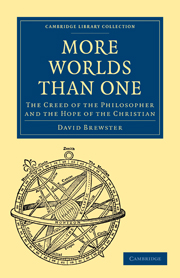Book contents
- Frontmatter
- Contents
- PREFACE
- INTRODUCTION
- CHAP. I Religious Aspect of the Question
- CHAP. II Description of the Solar System
- CHAP. III The Geological Condition of the Earth
- CHAP. IV Analogy between the Earth and the other Planets
- CHAP. V The Sun, Moon, Satellites, and Asteroids
- CHAP. VI The Motion of the Solar System round a distant Centre
- CHAP. VII Religious Difficulties
- CHAP. VIII Single Stars and Binary Systems
- CHAP. IX Clusters of Stars and Nebulæ
- CHAP. X General Summary
- CHAP. XI Reply to Objections drawn from Geology
- CHAP. XII Objections from the Nature of Nebulæ
- CHAP. XIII Objections from the Nature of the Fixed Stars and Binary Systems
- CHAP. XIV Objections from the Nature of the Planets
- CHAP. XV The Future of the Universe
- Frontmatter
- Contents
- PREFACE
- INTRODUCTION
- CHAP. I Religious Aspect of the Question
- CHAP. II Description of the Solar System
- CHAP. III The Geological Condition of the Earth
- CHAP. IV Analogy between the Earth and the other Planets
- CHAP. V The Sun, Moon, Satellites, and Asteroids
- CHAP. VI The Motion of the Solar System round a distant Centre
- CHAP. VII Religious Difficulties
- CHAP. VIII Single Stars and Binary Systems
- CHAP. IX Clusters of Stars and Nebulæ
- CHAP. X General Summary
- CHAP. XI Reply to Objections drawn from Geology
- CHAP. XII Objections from the Nature of Nebulæ
- CHAP. XIII Objections from the Nature of the Fixed Stars and Binary Systems
- CHAP. XIV Objections from the Nature of the Planets
- CHAP. XV The Future of the Universe
Summary
There is no subject within the whole range of knowledge so universally interesting as that of a Plurality of Worlds. It commands the sympathies, and appeals to the judgment of men of all nations, of all creeds, and of all times; and no sooner do we comprehend the few simple facts on which it rests, than the mind rushes instinctively to embrace it. Before the great truths of Astronomy were demonstrated—before the dimensions and motions of the planets were ascertained, and the fixed stars placed at inconceivable distances from the system to which we belong, philosophers and poets descried in the celestial spheres the abodes of the blest; but it was not till the form and size and motions of the earth were known, and till the condition of the other planets was found to be the same, that analogy compelled us to believe that these planets must be inhabited like our own.
Although this opinion was maintained incidentally by various writers both on astronomy and natural religion, yet M. Fontenelle, Secretary to the Academy of Sciences in Paris, was the first individual who wrote a work expressly on the subject. It was published in 1686, the year before Sir Isaac Newton gave his immortal work, the Principia, to the world. It was entitled Conversations on the Plurality of Worlds, and consisted of five chapters with the following titles.
Information
- Type
- Chapter
- Information
- More Worlds Than OneThe Creed of the Philosopher and the Hope of the Christian, pp. 1 - 8Publisher: Cambridge University PressPrint publication year: 2009First published in: 1854
